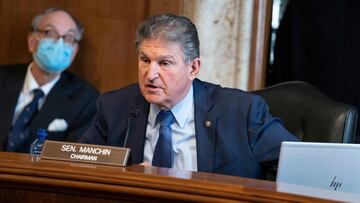Senator Joe Manchin says he will support bipartisan rail safety legislation
Senator Manchin hit the Sunday shows this morning and voiced his support for legislation to better regulate rail companies to avoid derailments.


West Virginia Senator Joe Manchin appeared on Face the Nation on Sunday to discuss rail safety and legislation circulating on Capitol Hill that would impose new rules on rail companies.
Senator Manchin said that it was time Congress took action to prevent rail accidents and disasters that can have catastrophic impacts on communities, like those seen in East Palestine, where a derailment led to an emergency evacuation order for nearly all of the town’s residents. During the interview, Senator Manchin recalled the 2015 derailment of a train carrying twenty-seven cars of petroleum, which, had it occurred just a few miles up the road, could have had readily consequences for residents of a small West Virginia town.
“Yes, I’m going to be supporting that,” @Sen_JoeManchin tells @margbrennan about proposed bipartisan rail safety legislation that would bring new rules for trains carrying hazardous materials.
— Face The Nation (@FaceTheNation) March 5, 2023
"It's time for us to get serious about this," Manchin says. pic.twitter.com/uKXnMvOS2B
At the time, rail safety experts issued a set of recommendations to avoid these sorts of accidents. Senator Manchin said none had been taken up by rail companies at the scale needed to bring the number of derailments down in a serious way.
To pass, the bill would need to be introduced in the House of Representatives, now under the control of Republican Speaker Kevin McCarthy. If introduced and approved in the House, it would move to the Senate before being signed into law by Presidnet Biden.
The White House published a press release expressing the president’s support for the bill.
I applaud this bipartisan response to the Norfolk Southern derailment in Ohio.
— President Biden (@POTUS) March 2, 2023
This bill would give us tools to hold these rail companies accountable. It's a critical first step.
Both parties should pass this, and I'll sign it into law. https://t.co/nqqs4weJJU
“I applaud the bipartisan group of senators for proposing rail safety legislation that provides many of the solutions that my administration has been calling for,” reads the statement.
What new rules are included in the legislation?
The Railway Safety Act of 2023 was introduced in the Senate by Sherrod Brown (D-OH) and JD Vance (R-OH), Bob Casey (D-PA), Marco Rubio (R-FL), John Fetterman (D-PA), and Josh Hawley (R-MO). The bipartisan bill would mandate the Secretary of Transportation implement new regulations for what federal law classifies as a “high-hazardous flammable train.” The trail that derailed in East Palestine did not fall under this classification, a notion that the governor of that state, Mike DeWine, called “absurd.”
The proposed legislation also affirms the power of the Secretary of Transportation to widen what trains fall under the classification of “high-risk flammable.” However, even trains that do not fall under this category but transport hazardous materials would be subjected to greater scrutiny under the new rules.
Informing state officials when hazardous material will be moved
According to a factsheet released by Senator Brown’s office, any company shipping hazardous material will be required to “provide advance notification and information to each State emergency response commission.”
A report issued by the National Transportation Safety Board found that the derailment in East Palestine, Ohio resulted from a wheel bearing overheating. To avoid this issue in the future, rail companies would be required to install hotbox detectors every ten miles on their tracks. These sensors alert dispatch to possible issues with the train, which are evaluated and relayed to crews onboard so the locomotive can be stopped before an accident occurs.
Increased number of inspections
As for the trains themselves, the legislation would require all locomotives carrying hazardous material to be inspected at “regular intervals.” These inspections will be carried out by “trained mechanical inspectors will help to identify wheel bearing problems and other mechanical issues before overheating or, ultimately, derailments occur.”
Larger fines for rail companies
Related stories
Rail companies would also be subject to larger fines and penalties when their negligence leads to accidents by increasing the maximum fine from $225,000 to one percent of their annual income. Often, rail companies cut costs by reducing staff and increasing the length of the trains. When accidents inevitably occur, the penalties faced by the companies are not high enough to incentive a change in behavior. In other words, the profits generated by these cost-cutting measures are greater than the penalty they would face. Increasing the amounts is a first step in holding these companies, which are willing to put entire communities at risk, accountable.
According to the White House, penalties for a company like Norfolk Southern could reach as high as $50 million.

